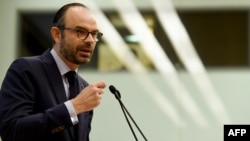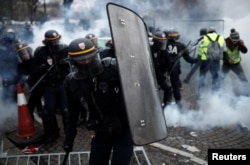France’s government has suspended a deeply unpopular planned fuel tax hike that unleashed nationwide protests by so-called yellow vests — a leaderless movement angry over the high cost of living and a government it claims cares only about the rich. However, there are sign that suggest the crisis is far from over, with many calling the measures insufficient.
After months of ramming through unpopular reforms, the government of President Emmanuel Macron essentially made a U-turn by suspending a fuel tax increase set for January 1 — along with a planned hike for heating prices. The six-month moratorium aims to allow time for dialogue to help end Macron’s biggest crisis since taking office last year.
Announcing the moratorium, Prime Minister Edouard Philippe said he understood people’s pain.
Philippe said you’d have to be deaf and blind not to understand the public anger. No tax warrants putting the nation’s unity in danger, he said, noting more than three weeks of massive protests have left four people dead, hundreds injured and have hit the economy hard. The violence, he said, has to stop.
The prime minister’s tone contrasted sharply with what critics claim is an arrogant administration, uncaring about working and middle-class concerns.
But Philippe also said any tax relief would mean cuts in public spending to meet France’s European Union budget obligations and not to sink into further debt. And he said the government will keep promoting green policies. It claimed the fuel tax hike is necessary to fight climate change.
Initial reactions suggest the protests are likely to continue.
Lionel Cucchi, a yellow vest representative from the southern Bouches-du-Rhone region, told France’s BFMTV the government is beginning to listen — but people aren’t satisfied because the tax increase is only suspended and not dropped. Some hardliners are even calling for the government to resign and new elections to be held.
Environmentalists also are unhappy, but for different reasons. Lucile Dufour, with Climate Action Network, called the fuel tax suspension an unacceptable rollback on climate commitments by the French government.
“If the government wants to be credible on the fight against climate change, if the government wants to actually accelerate the fight against climate change ... to respond to the IPCC’s 1.5 report that was just released, the government has to maintain this carbon tax,” she said.
Dufour said the government can take measures that would help struggling French citizens cope with the fuel hikes and also meet its climate commitments.






